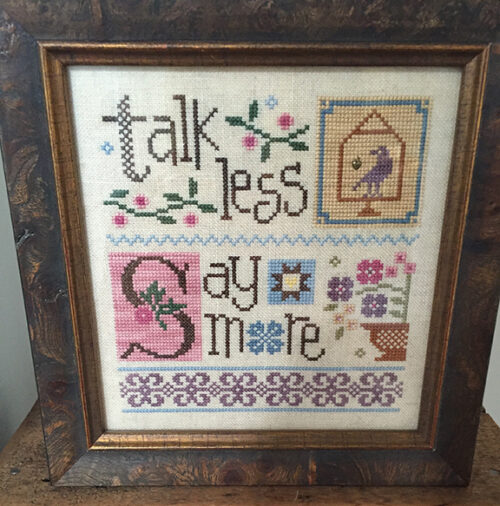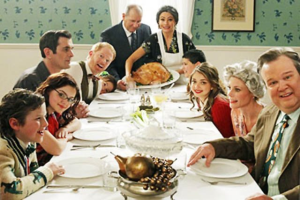
I have a dream . . . in which I’m sitting at a kitchen table with my cousins—very close cousins, whom I love dearly—and we’re reminiscing, schmoozing, laughing about old times at another kitchen table, in a small Brooklyn apartment, as mythical as it was real. We tease each other about the kids we once were. We keep nibbling at whatever food and snacks are within reach.
What makes this a dream is one simple wish: when politics rears its ugly head, and we find ourselves across that nasty divide, we listen—really listen—to each other. All one cousin, staunch Republican that he is, has to say is one word to make me cringe: Yes, Benghazi.
I try, really I do, to put things into perspective. I ask him to look at past administrations, Republican and Democratic alike, to see if we might reach some common ground re: fallibility and accountability on both sides. There’s nothing pretty about politics. At its purest, it’s a rather benign word encompassing the ‘science of government’ or ‘affairs of state,’ rooted in the Greek politikos, meaning ‘of, for, or relating to citizens.’ But even way way back, the ideal vs. the pragmatic and/or power-driven state of governance was teased apart by philosophers. All of which doesn’t do much to mitigate today’s connotation of politics and with it, the encroaching reality that the truth of any situation is hard to come by. We all have mindsets, predispositions, call it what you will. We live in world governed by all the news that’s fit to summarize and spit out to suit a spin mentality that supports those predispositions.
It’s the reason that presidential debates put is into a tailspin or make us fall sleep, and, alas, rarely change our minds.
It’s the reason elections, presidential or otherwise – make everyone I know complain about those hideous placards marring the landscape for weeks and the bombardment of 30-second spots messing with any pleasure I get from watching TV. (Even with DVR capability, allowing me to fast-forward through commercials, I can’t help but feel the offense of it all during the height of election season.) Don’t even get me started on the obscene amount of money that goes into campaigning. All that complaining seems to get us nowhere.
Go ahead, remind me I’m preaching to the choir.
Yes, I take it all too personally. I worry about climate change, terrorism, a woman’s right to choose, the future of the Supreme Court. I worry about people who spout about the right to bear arms without really understanding the nuanced language of the Second Amendment. With cousins living in Ohio, I sometimes imagine myself on the campaign trail, a volunteer. Think of the sense of accomplishment if I could change the mind of just one person, cousin or otherwise, leaning red! Almost as gratifying would be getting someone to listen—really listen—to the information I’m trying to share. This person, like my cousin, would probably say he’s listening, and, to some degree he is. But what he’s hearing is something else completely.
He would probably say the same about me.
My brother may be a better (or better yet, more determined) person than I am in his efforts to get my cousin to see the light, to whatever degree possible. I stay away from family dramas on Facebook, but I do read the interactions and sometimes, when I just can’t help myself, I put in my two cents. A few days after the horrendous shooting at Oregon’s Umpqua Community College Campus, my Facebook feed showed me that my cousin had shared a Wired Outdoors link with this message: Making Good People Helpless Won’t Make Bad People Harmless. On their own, the words are hard to argue with. Except that the telling graphic—a rifle underscoring the words—gives a not-so-subliminal spin to it. Wired Outdoors is apparently a hunting TV show, and reducing the complex issue of gun control to a simplistic phrase brought me to a place between rage and tears.
You know the saying: You can choose your friends . . . but family you’re stuck with. Stuck or not, I periodically find myself with a nostalgic longing to be with family, no longer around the proverbial corner. With distance more the norm than the exception these days, family get-togethers take a bit of planning and effort. The alternative—disappearing from each other’s lives completely—is not an option.
There’s nothing original about my scenario, and I know it. Case in point: a good friend tells me about family group emails in which one of her brothers insists on sharing what is now generally understood to be egregiously manipulated Planned Parenthood videos. All efforts at trying to make him see the ruse for what it is are clearly a waste of her time.
But we try . . . and we try . . . and we try. And once in a while, I like to think, we can step outside of ourselves, take the time to listen and read with an open mind.
Like I said, this is a dream.
 And even if we can’t cross that political divide, we still manage to sit around a table. And eat.
And even if we can’t cross that political divide, we still manage to sit around a table. And eat.

